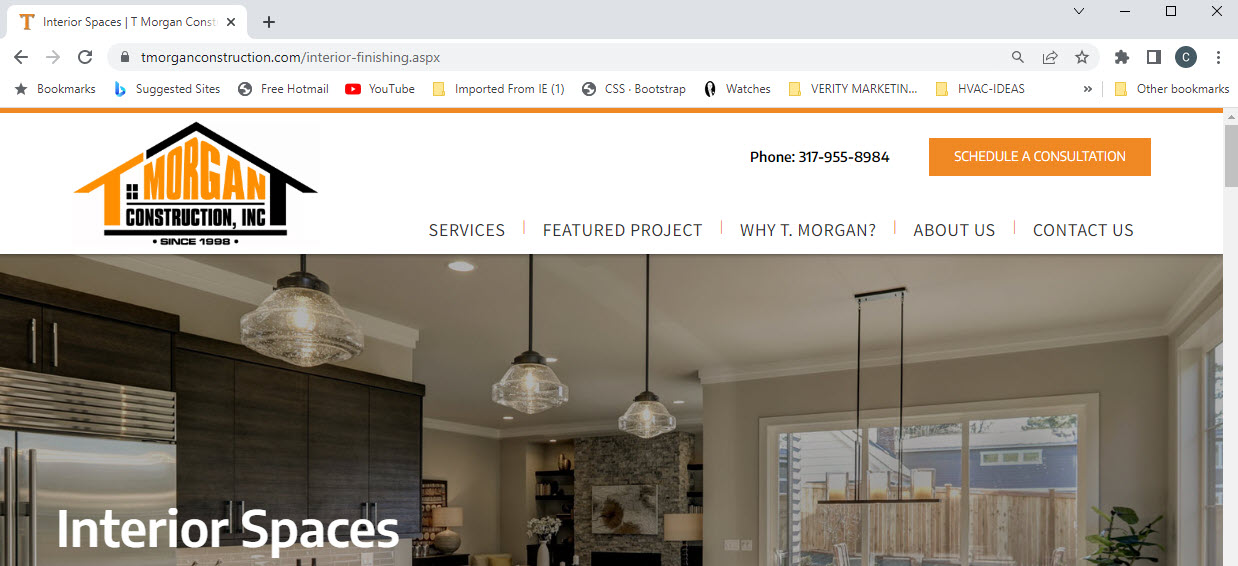
What is Business Hosting?
Upgrade your online presence and give your business a competitive edge with professional Business Hosting, one of the best kept secrets around.
Need help managing your small business website? click here
A business domain name is a unique name that identifies a website or email address on the Internet.
An example would be our domain name verityhosting.com. We use this for our website www.verityhosting.com and our email address support@verityhosting.com
Visitors can easily remember and type a domain name into their web browser to access the website.
So the domain name is used to point the user to a website or email address, similar to how a street address identifies a physical location.
A small business can register a domain name and use it for a website, email addresses, and other online presence.
Having a good domain name that people can remember is essential for your small business. Here are some reasons you need a good domain name for your business.

Any business wishing to create an online presence should have a good domain name. It helps customers find and interact with your business by giving it a professional and unique brand.
A good business domain name shows your customers that your business is serious and dedicated to developing a reliable company. Which helps encourage trust and helps create more credibility.
Your domain name is a straightforward way to demonstrate to new potential customers that you are worth their time and attention.
Always remember that customers like to trust professional businesses with consistent branding. And your domain is a big part of your brand.
A good domain name establishes a business's brand and identity. It allows customers to easily remember your business name and find you online.
A good domain name gives your business a professional and credible appearance. It makes it easier for customers to trust and do business with your company.
A good domain name can be used in marketing and advertising campaigns to drive more traffic to your business's website. It is a critical element of your business's online presence.
A domain name can be used to create professional email addresses for a business, such as info@yourdomain.com or sales@yourdomain.com
A good example would be kimsflowers.com, as it already shows the potential customers what the site is about flowers, and the owner's name is most likely Kim.
When a customer is looking for your business and your domain name is similar to your business name. In that case, that's a good thing and could allow customers to find your business more easily.
Some SEO Experts believe that the words in a domain name may play a role in how a website ranks in the search engine. A domain name containing a keyword related to the industry may help boost the website's search engine ranking and move the site closer to the first page.
A domain name allows a business to have a website, blog, and other online services that can be easily updated and controlled by the business owner. This will enable you, the business owner, to better reach and engage your target audience, leading to higher conversion and sales.
Having a good domain name for your business is crucial in building a well-established online presence. This will also help you establish your brand and make it easier for customers to find and interact with your website and other online services.

Choosing the right domain name for your business can make a difference in how well-known and trusted your business would be.
Example: You own a small auto repair shop Joe's Auto. Some good domain names would, of course, be joesautoservice.com or joesauto.com; however, if joesautoservice.com or joesauto.com is already taken, you will need to find another domain name or convince the current owner to sell you the domain.
If you are unable to buy the domain name from the current owner, your best bet is to find an alternative.
Another domain alternative would be joes-auto.net or joesauto.org. However, a .net or .org extension are not very good options. The .net domain extension is used for internet providers or tech companies, and the .org extension is used for organizations.
After a little more research, you see that joesautorepair.com is available from a seller for a few hundred dollars. This is a good choice and will help customers easily find you online. It will also show what your business is all about with just a glance at your domain.
Think About: When looking for a good domain name for your small business, it's important to keep a few things in mind:
By testing your domain name with friends and family, they can help check for any spelling, pronunciation, branding, SEO, availability, or other issues. This will help to make sure that your domain name is the best domain name for your business.
Keeping your business domain name safe is vital in protecting your online presence and ensuring that you don't lose your domain to online scammers.
Registering your domain name for several years will help ensure that it doesn't expire or become available for someone else to register.
Make sure that the contact information associated with your domain name is current and accurate. This will ensure you receive important notifications or renewal reminders from your domain registrar.
Use a reputable domain name registrar with a good track record. This will go a long way in protecting you and your business from any domain purchasing issues.
If available, use two-factor authentication when logging into your domain name registrar account to manage your domain. This will give you more security and make it harder for someone to try and steal your domain name.
Regularly monitor your domain name to ensure that it is not being used in a negative way. It's a good idea to set up monitoring to look for any changes to your domain. You can also set up Google brand tracking to monitor your domain and look for any negative mentions of your company.
It is a good idea to add some extra security to your website to help protect your other online services and applications. Adding extra security to your website with the use of a strong password will help to protect your domain name and online reputation.
By following these steps, you can help protect your business domain name and website and ensure that your customers can always find your business on the web.
As previously mentioned registering your small business domain name for five or more years has several advantages
Registering your domain name for five or more years gives your business more credibility. It also shows that your company plans to be around for a few years, which helps build trust with your customers and search engines.
Registering your domain name for five or more years can save you money, as most domain registrars offer discounts if you purchase your domain name for more than one year.
Registering your domain name for five or more years will help you avoid accidentally letting your domain name expire.
Longer registration will improve your website's reputation, demonstrating that your business is stable, credible, and well-established.
Search engines like Google do consider the age of a domain name and how long it is registered as ranking factors. Having a domain registered for a more extended time, like five years or more, may boost your website's ranking slightly.
So registering your domain name for five or more years gives your business more credibility. It also allows you to not worry about registering your domain every year, and it may even boost your website with search engines.
Buying similar domains for your small business is a good idea. It involves registering domain names similar to or variations of your primary domain name to prevent others from using them.
Example:
Primary Domain Name: yourdomain.com
Similar Domain Names: your-domain.com, yourdomain.org, yourdomain.net
By purchasing similar domains, you can prevent others from using these domains to create fake or phishing websites that could damage your brand.
When buying similar domains you help prevent competitors from using similar domains to create websites that could draw attention away from your small business website.
You could purchase a domain with some traffic links already pointed to that domain. You could increase the traffic to your main website and online visibility.
Purchase similar domains that help catch customers that mistype your primary domain. This is a good idea if your domain is more difficult for people to spell or remember.
There are some legal protections against sabotaging a business by purchasing a similar domain. Suppose someone tries to Register domain names similar to your company's name or brand name with the intent to sell or use it in bad faith. In that case, this is considered cybersquatting and is illegal.
However, that is hard to prove and could be costly to resolve. For these reasons, it's best to purchase similar domain names from the start and avoid these issues.
When buying domain names for your business, think about any future issues you might have before purchasing the domains. It's also important to ensure that you comply with any laws or regulations of your country.
Domain providers will try and sell you on adding extra security for your domains. The added security will hide the information on who owns the domain. For home users, this is a good idea; however, for businesses, you may want to keep this information public here's why.
Keeping your business domain information public shows that your business is legitimate and transparent, which can help build trust with customers.
Making your domain registration information public will make it easy for customers and other businesses to find your contact information and get in touch with you.
Many countries require that business domain information is publicly available as part of their regulations. Failing to make your business domain information public could result in penalties or fines.
Keeping your domain information public may help with your SEO, as search engines can see the information and match it up with your business. Search engines can be suspicious of companies that hide their domain registration information. This is due to spammers that typically hide their registration information to avoid being blocked by search engines.
When registering a domain name, your personal information, such as your name, address, email, and phone number, is recorded in a public database called WHOIS.
This information is often used to verify the ownership of a domain name and for troubleshooting purposes.
Some domain registrars will offer a privacy service to mask your personal information from the WHOIS database. Still, it's important to consider the pros and cons of doing so.
Keeping your domain name information public shows the search engines you have nothing to hide and that you can be trusted. It also allows new customers and businesses to more easily find your business contact information.
Domain Name Servers (DNS) are a critical component of the Internet's infrastructure. They are essentially a series of servers that translates domain names (such as "yourdomain.com") into IP addresses (such as "192.168.100.145") that computers can understand.
When a user types a domain name into their web browser, the browser sends a request to a DNS server. The DNS server then looks up the IP address associated with that domain name in its database and returns it to the browser.
The browser can then use that IP address to connect to the web server hosting the website associated with that domain name.
DNS servers can be set up and managed by a variety of businesses, including hosting companies and domain registrars.
You can set your local computer DNS settings to point to your hosting provider, or you can use public DNS services like Google.com name servers.
Googles name servers are: 8.8.8.8 and 8.8.4.4
There are other public name servers as well. Cloudflare.com servers are: 1.1.1.1 and 2.2.2.2
DNS servers play a critical role in name-to-number lookup. This allows users to access websites and other internet resources using human-readable domain names rather than IP addresses.
When buying a premium domain name, it's important to conduct thorough research to ensure that it is relevant to your business and has a good reputation.
Buying a premium domain name can be expensive. The price of a premium domain name can vary depending on certain things, such as the domain name's length, relevance, and extension.
A premium domain name will help better establish your business's brand and identity online. It can be easy to remember and make a more substantial impact on potential customers.
A premium domain name can give your business a sense of authority and credibility. It can help to build trust and increase the chances of customers buying from your website.
A premium domain name may play a role in how your website ranks in search engine results. A domain name that includes relevant keywords may help your website rank higher for those terms.
A premium domain name can also drive more traffic to your website, as it can be more memorable and easy to share with others.
Buying a good premium domain name is a great idea. It may cost a little more, but it can give your business that boost needed in the challenging online marketing place. It allows you to stand out in the crowd and may even give you a little boost in traffic.
When buying a premium domain name, there are a few things to consider:
Research the domain name to ensure that it is relevant to your business and has a good reputation. Check the domain name's history to see if it has been used for any malicious or illegal activities.
You will need to do a search on the domain name marketplace to find a premium domain. Godaddy.com is one place to start.
Compare the price of the domain name with other similar domain names on the market. Some domain names may be overpriced, while others may be underpriced.
Review the terms and conditions of the sale before making a purchase. Make sure you understand any restrictions or limitations on using the domain name.
Before buying a premium domain name, it is a good idea to find out who the current owner is. This way, you can check the owner's reputation and see if there were any past issues.
Older domains may have more value as they have been around for longer and have more backlinks and history.
Some extensions are more popular than others, .com is the most popular and well-known, while other extensions may be less common but still valuable. We recommend that you stick with a .com as it's a higher-quality domain extension.
It's a good idea to use an escrow service to protect your purchase. This ensures that the seller gets paid only after the domain name has been transferred to you and you have confirmed that everything is in order.
After the purchase, you can use the domain name for your business website, email addresses, and other online services. A good high-quality domain is a great idea for any small business.
Monitoring your small business domain name is an important step in protecting your online presence and ensuring that your customers can always find your website. Here are a few ways to monitor your small business domain name:
By monitoring your small business domain name and website regularly, you can help find any issues early before they become a real problem. This will help ensure that your customers can always find your business website.
Protecting your domain and domain account access is very important. You should only allow people who you can trust to have access to this account.
We see a lot of companies transfer their domain names over to a new marketing company when there is no need to do so. Your domain name only needs to be moved if you have problems with your domain provider.
Moving to a new website or email provider or adding email security records does not require moving your domain name. These types of changes only require updates to your DNS zone file records, nothing more.
Keeping your domain name access with people you trust is essential to ensure that your online domain name is protected and under your control. Here are a few ways to keep your domain name in trusted hands:
By following these steps, you can help protect your domain name and ensure that it remains in your control. Again you own your domain name only if it's under your control.
There are many places where you can register your business domain name. Some popular options include:
ICANN (Internet Corporation for Assigned Names and Numbers) is a non-profit organization that manages the allocation of domain names and IP addresses. ICANN-accredited registrars are authorized to sell domain names to the public.
Many web hosting companies also offer domain registration services. You can sometimes receive domain discounts when purchasing your domain with your hosting account.
There are also domain resellers, where you can buy and sell domain names. These resellers are a good place to find premium or expired domain names for registration.
When purchasing a new domain name for your business, use a well-known company like Godaddy.com or our company VerityHosting.com. A good company will offer you more security, options, and support.
A domain name and a URL (Uniform Resource Locator) are connected, but they are not the same.
A domain name would be included in the first part of the URL.
Domain Name Example: yourdomain.com
A URL, on the other hand, is the complete address of a specific page or resource on the Internet. The URL includes the domain name and any additional information needed to locate a particular page or resource on a website.
URL Example: https://www.yourdomain.com/about-us
This URL directs customers to the "about-us" page for the website https://www.yourdomain.com
In summary, a domain name is just the youdomain.com portion of a website, while a URL is the complete address of a specific page or resource on that website.
As we previously mentioned, a domain name is a unique name that identifies a website or email address on the Internet. For example, yourdomain.com is a domain name.
A website, on the other hand, is a collection of web pages that can be accessed through a domain name. It contains information, images, videos, and different types of content that can be viewed by users.
The website can be built using different technologies and platforms. It could be a blog, an e-commerce store, a landing page, etc.
To summarize, a domain name is an address that directs people to a website. While a website, on the other hand, is the collection of files, images, and information that you see when the website comes up in your internet browser.
In summary, a domain is an address that directs you to a website, while a website is the content you see when you visit that address.
Any business that wants to succeed and grow in the digital world should prepare to invest in a business domain name. It will help make sure that your site is easy to use and that people can find the information or products you are selling.
Your business's domain name should be something that sticks in people's minds and is easy to type and pronounce.
Making your business details easily accessible enables customers and other businesses to locate your contact details and communicate with you.
All photos used have been curated by Verity staff

Verity Editorial Staff
The editorial staff at VerityHosting is a team of hosting experts with over 25 years of experience managing, monitoring, and maintaining hosting services for small businesses.
Get helpful small business tips from VerityHosting.com

Upgrade your online presence and give your business a competitive edge with professional Business Hosting, one of the best kept secrets around.

Learn what web hosting is and how to choose the best hosting provider for your next project.

Take your reliability, security, and support to the next level with fully managed web hosting.
Verity Hosting - Providing professional managed hosting services while being focused on helping our clients to build a successful business on the web and on mobile.